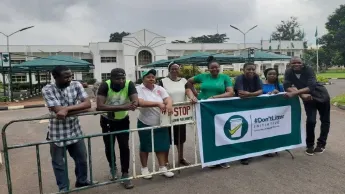Litter has a home. Find it, Use It!
- 2023-01-31
- Guest contribution by alumna Egodi Uchendu
- Comments

Professor Uchendu wants her university in Nigeria to be a clean and healthy place. That’s why she has launched a waste management project on the campus.
Let’s consider this: The neatest cities in the world started at some point to manage their environment and especially the wastes they generate. One day I decided that I want my university, the (UNN), to start its transition into one of the neatest places in Nigeria – and to become a role model for other cities all over the country.
I articulated the “Don’t Litter Initiative” within the framework of the 2022 as the vehicle for driving the change process. The “Don’t Litter Initiative” addresses poor and unhealthy attitude to litter and waste handling on the campus. It mobilizes residents, users and visitors to the campus to get involved in this change process.
How it started
The main campus of UNN sits on 1,287 hectares and has a population of over 50,000 people. A major environmental challenge confronting UNN is to responsibly and sustainably manage its wastes. When we started the project it was obvious that the university had a litter problem and waste management crisis that derive from deficient behavioural patterns by residents, users, and visitors to the campus.
The outcome negates the United Nations Sustainable Development Goals (SDGs) – more concrete and – that seeks to “make cities and human settlements inclusive, safe, resilient and sustainable” and aims at “environmentally sound management of (…) all wastes” and “waste generation through prevention, reduction, recycling and reuse.”
It’s already all too clear that poorly managed waste poses serious environmental and health problems. When litter takes over our campus, we become restless and uncomfortable learning or working in it. The core message we are pushing to the community is that litter has a home; everyone should find it and use it. When we comply, evacuation for recycling and other uses becomes easy and sustainable.
How it developed
The “Don’t Litter Initiative” pushes towards policy design, development and implementation, and contextually induced proactive measures to safeguard the environment and make it litter-free. Since the project kicked off in late April 2022 we managed to undertake several activities to reach our goal. We completed the first phase of an environmental engagement survey to help us comprehend the University residents’ attitude towards environmental management. The project team also liaised with the school management to evacuate accumulated waste, and dismantle illegal dumpsites across the campus. Starting on World Environment Day, in June 2022, team members organised regular environmental outings focused on picking and separating of waste within the university community.
Sensitization campaigns commenced in May 2022 via handbills, university-wide list serves, radio talks and jingles, and social media adverts. Waste bins and trash bags suitable for the university environment according to the designated waste outlets in the office areas, hostels and residential areas were sourced and advertised. A seminar and workshop series lined up for retraining the university community on responsible and sustainable management of the environment and waste generated in the community have begun.
How we go on
We ended the year of 2022 on a good note with much support from the university administration and the community. We are all enthusiastic about the change process so far initiated and we are optimistic that the attitudinal transformation towards a sustainable clean campus will make further progress.
This year we focus on the by the Engineering and Vocational Technical Education faculties of the university. We also want to invent a model for waste management for Nigeria’s numerous mini cities. I have no doubt that by the end of 2023 we will have made further progress in our project.
Read further on the Alumniportal Deutschland
The Humboldt cities: research, practice, cases initiative links academic research and practical implementation in the contemporary fields of urban and regional planning. It focuses on issues relating to sustainability.
Preventing waste, using renewable energies, seasonal shopping: we’ve collated the most effective tips for a climate-friendly lifestyle. How to make your everyday life more sustainable.
